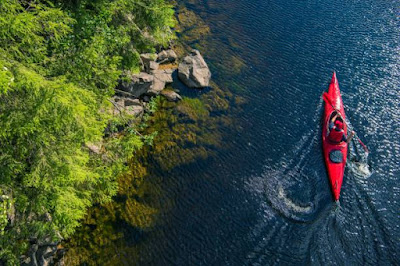The best option of discovering the scenic views of the Andamans is kayaking around them. The activity is the most eco-friendly and environmentally safe water sport. Learning to paddle a kayak is very easy, and it takes a few minutes only.
We kayak to observe nature closely. You can watch a brilliant mangrove ecosystem for a few hours while kayaking in the mangrove. On the other hand, watching the sunset while sitting on a kayak just above the surface of the sea is another amazing idea. The changing color of the sky during the sunset sets your mind free. Kayaking in the Mangroves offers lush Mangroove forests in the lap of nature.
Nowadays,
the young generation is keen to watch the natural phenomenon, which is called
bioluminescence. One has to go kayaking in the dark in the night to watch
bioluminescence, and it is famous in the Andaman Islands.
How is the experience of kayaking in the mangrove?
We
start this kayaking trip early in the morning so that we can show the birds,
which reside in the mangrove. Some can also sing very sweetly, and others are
brilliantly colorful. The waters are transparent, and you can spot a few
varieties of fish swimming beneath the surface.
The
green mangrove crabs are massive, and a full-grown crab can weigh up to 4
kilos. The mangrove shelters them along with a few more crab species, that you
can witness while kayaking. You can spot a few funny fish, those are called
mudskipper. They live in a group and can breathe both in the water and in the
land.
The most venomous snakes can easily be spotted in the mangrove, and we call them black-white spotted sea-krait. Despite being venomous sea snakes, they breathe only from the air and can’t breathe underwater. These species are shy and friendly to humans.
How is kayaking while watching sunset experience?
Sunset
kayaking covers a bit of watching mangrove, a bit of watching bioluminescence
by post-sunset, and an amazing sunset right above the surface of the water.
This activity is two and a half-hour long.
Our instructor briefs you about how to paddle and makes you well aware of kayaking in the dark at the night. Your instructor takes you close to the mangroves so that he can show you the interesting species, which shares the mangrove ecosystem.
Your
instructor does explain about the species you see on a naked eye. He takes you
to the Lighthouse of Havelock to show you the blissful sunset. We stop there
for a while and assist you in clicking pictures and recording your moments for
charming memories. Post sunset, We start coming back to the shore, and that
takes another thirty minutes.
In the
dark, each time you paddle. You see the sparkle of microscopic living
organisms, which is called bioluminescence. If the sky is clear enough, you can
see billions of stars. Which you may have never seen in your life.
What
natural phenomenon can be seen while night kayaking in Havelock?
Marveling
stars in the clear sky, and glowing bioluminescence in the surface of the
water. These are the two natural phenomena, which attract tourists around the
world for night kayaking. This activity is not regularly available, because it
requires a dark environment.
One
only can go for night kayaking when there is no Moon in the sky, the timing can
be 2 am and can be 6 pm. The best time for night kayaking
in Havelock would be from the beginning of October till mid-May.
What is bioluminescence?
Living
light is called bioluminescence, it is like Fireflies. Over the years, a few
marine species have adopted a self-defense system, They can sparkle by
converting their chemical energy into electrical energy. This is what is called
bioluminescence. A few fish, shrimps, plankton, and some microscopic living
organisms are the ones of them.
We
charge 2500 INR for any of the above-written kayaking trips. Which includes a
double-seated kayak for couples, and a single seated for singles with all the
required safety equipment. You should be able to paddle the kayak on your own,
and children should be above twelve years old. We guaranty your satisfaction
with charming memories of kayaking with us.








0 Comments